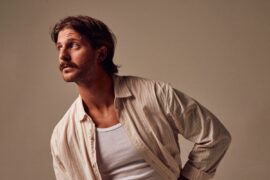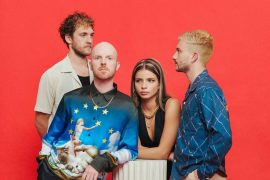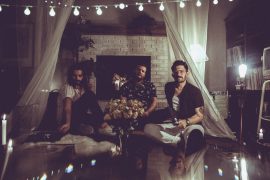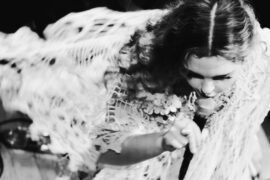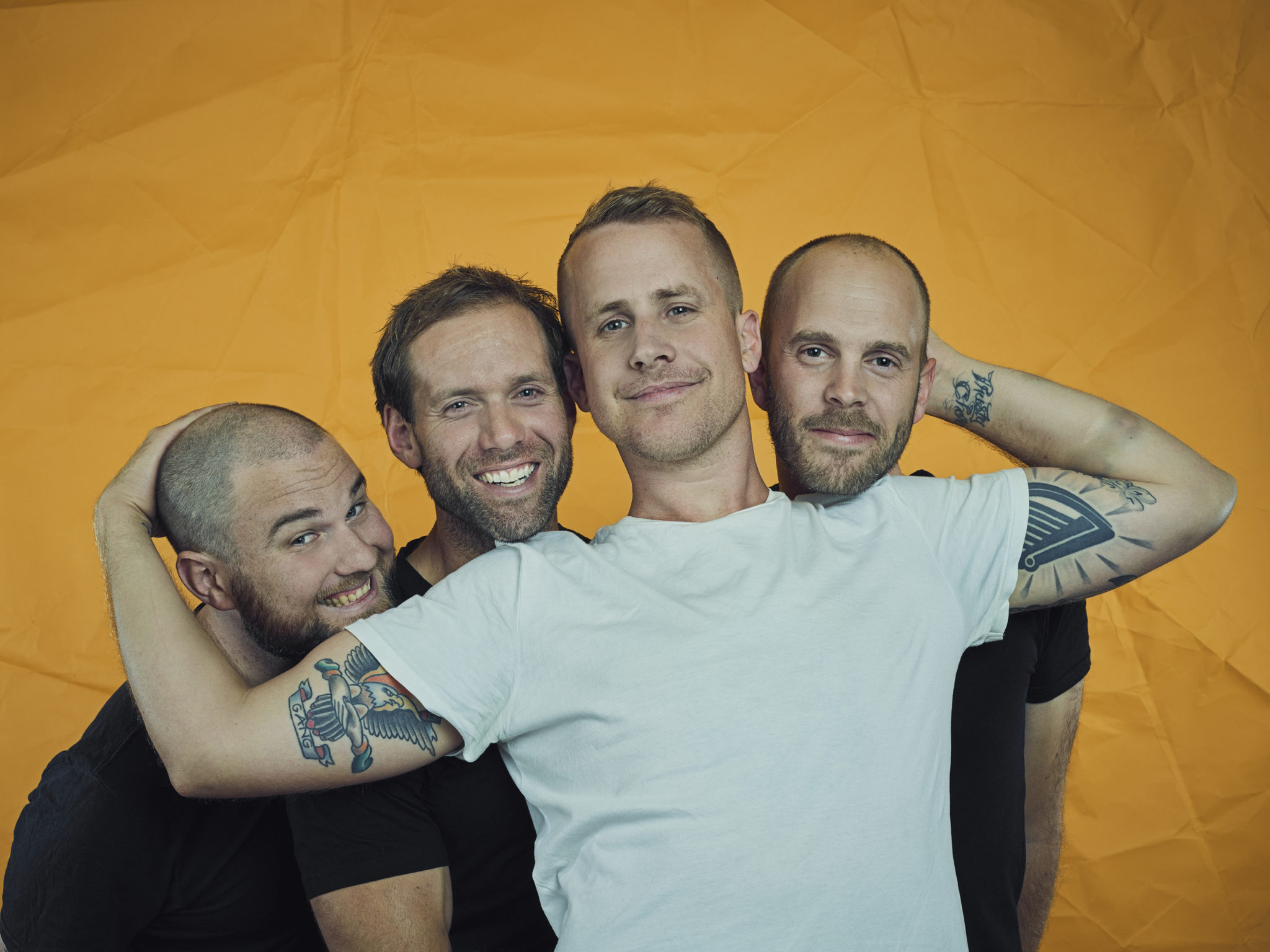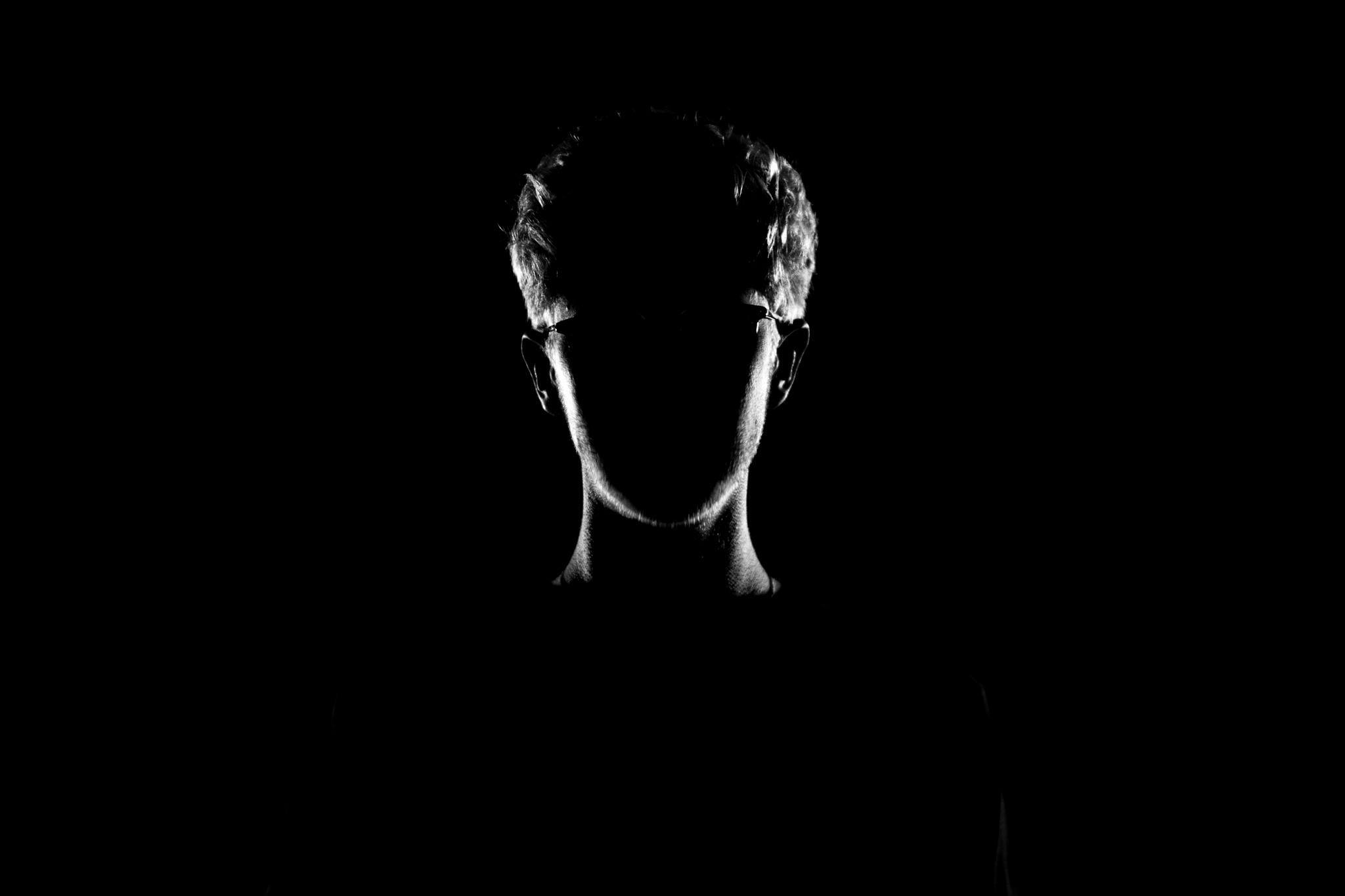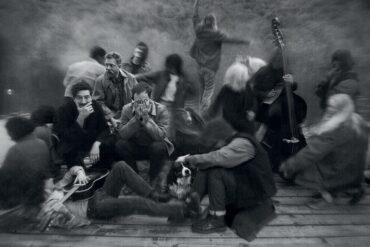Ok Cowgirl’s Leah Lavigne has always wanted to be in a rock band. After 10+ years of music-making and self-discovery, debut album ‘Couldn’t Save Us From My Gut’ is a culmination of self-discovery and explorative artistry.
‘Couldn’t Save Us From My Gut’ – Ok Cowgirl
There’s a million ways to exist in this world. There’s a million ways to be beautiful and be successful and be valuable and loved.
Brooklyn-based Ok Cowgirl have returned with their highly-anticipated debut LP, Couldn’t Save Us From My Gut (via Easy Does It Records).
A stunning 10-track confessional, the record leads with bold vulnerability and electric storytelling – and it’s everything we’ve been waiting for.
Couldn’t Save Us From My Gut is optimistic as it is brutally honest, and cathartic as it is peaceful. The record once again shows that the band never falters in pushing the limits of their self-expression and just how they want to do it. Ok Cowgirl’s frontwoman Leah Lavigne shared, “a lot of the time, I found that the harder choice was the correct choice.” This was the sentiment that ultimately bridged the album’s themes of burgeoning self-discovery in your early 20s.
The record begins as rock guitars disperse around Lavigne’s evocative vocals in ‘Little Splinters,’ which Lavigne shares was written years ago. The track, she shares, was one of many that were written years ago – waiting to be rediscovered at the right moment. A self-reflexivity that only arrives with hindsight shines through in following tracks ‘Forever’ and ‘Our Love,’ while ‘Larry David’ and ‘On My Mind’ capture an explorative playfulness in bursting instrumentals and forthcoming vocal performances. ‘Mars Cheese Castle’ and ‘Swirling’ position mundanity in the most poignant way, using passing moments to make sense of much bigger feelings like grief and longing.
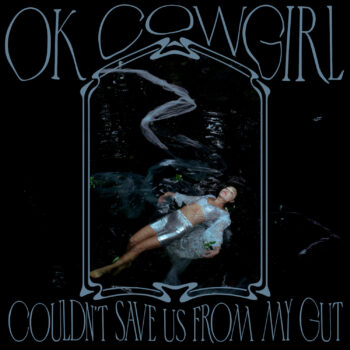
After over a decade of making music, Lavigne is still finding more of herself everyday. Her fearless storytelling is endlessly creative and seamlessly polished, and to her, songwriting has always been a form of cathartic escapism. She describes a stream of consciousness writing style, which – as she states – allows her to write the songs before she’s ready for them. I found this quote especially poignant; while the record is a result of some old and some new, Lavigne reminds me that growth is not static, and constant evolution results from sliding backwards and forwards from time to time. Couldn’t Save Us From My Gut is definitively Ok Cowgirl now, but there is so much more to be discovered. This record is only just the beginning.
Leah Lavigne from Ok Cowgirl sat down with Atwood Magazine once again to discuss how she came to find authentic artistry and staying true to herself. Beyond the conception of the record, Lavigne discussed the importance of representation in unlocking possibility, and how this was especially poignant for female artistry as an Asian-American woman.
— —
:: read more Ok Cowgirl coverage here ::
:: stream Couldn’t Save Us From My Gut ::
:: connect with Ok Cowgirl here ::

A CONVERSATION WITH OK COWGIRL
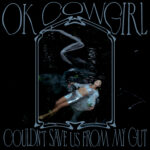
Atwood Magazine: Congratulations on Couldn’t Save Me From My Gut! How has the release experience been so far?
Leah Lavigne: Yeah, I mean, gosh, it’s been a whirlwind. I really tried to manage my expectations. Having done a few releases on my own – EPs with my past solo project and some singles with this band – I’ve learned it’s best to manage your expectations and try to stay really grounded during the release cycle so that you can be pleasantly surprised. At the end of the day, it’s a good reminder to not get too caught up in how it’s received, and how the numbers and the statistics look, and to just remember why I’m making the music in the first place, what it means to me and why I’m truly sharing it, which is not to make money or get famous. It’s to talk about things I think are important and to connect with people. I really try to ground myself in that way. Maybe it’s maturity and maybe it’s age but I feel like this time around I was actually able to do that. Whereas in the past, I still would get caught up and often disappointed, and it feels really intense. This time I’m just happy. And people like it, I get to focus on the next thing, and I don’t know, it just feels a lot less dramatic than it did when I was younger.
It's definitely a lot more of an expensive project than anything you've put out previously. What made you decide to do a full length album as opposed to releasing these songs as an EP or singles?
Leah Lavigne: Yeah, I think it was a couple things. In some ways, it was quite practical. We were finally organized enough and could get the money together to embark on a project this big. And secondly, we felt like we were at a point in the band’s career where it was time to do something like this. Whereas before, when we were just sort of establishing ourselves, figuring out our sound, it made more sense to just do a single or an EP because nobody was really paying attention. And I mean, we’re still figuring ourselves out. But we got to a point where we were like, okay, we know who we are, we want to share this with the world.
We have songs that are really poppy and feel good, and songs that are more electrifying and rock & roll. Others are much more intimate, and we felt like we actually needed a full-length record to be able to show people a complete view of, what the band is, what our sound is, and what you can expect if you go to an OK Cowgirl show – we’ve always really been a live band first.
I think it’s so nice that you feel a sense of calm now with this release, I guess that comes with feeling like you’re more assured in the band’s identity. How would you say releasing music is different as a band versus as a single artist?
Leah Lavigne: Well, I had a solo project for – oh gosh – I want to say almost 10 years before I started this band. I had just been finishing up my undergrad degree, and I had just grown kind of bored with my music. I felt sort of stuck. I didn’t feel excited about it. It didn’t seem like the people in my community were excited about it. The reason I had initially started performing was because I love the feeling of connecting with a live audience. I discovered songwriting at a pretty young age, when I was like twelve, thirteen, and that’s something I just love to do. It helps me process my emotions, it feels very cathartic. It’s something I’m obsessed with and will always do. But I didn’t start performing until a little later. My reason for that was because I’ve always written quite introspective music. I just found it so fulfilling to be able to play these songs that were quite personal, and to have people come up to me after and tell me how much that song meant to them: how it made them feel, how it related to their life. That was so fulfilling to me that I was like, well, I guess I got to share my music. That’s the kind of experience I crave as a listener so often. So if I can do that on the other side of the interaction, like, what an awesome, awesome blessing.
When I had hit that rough patch in my solo career where I felt like I just wasn’t connecting with people, I was like, I need to change it up. That’s when I sort of decided that I wanted to start a rock band. At that point I didn’t know how to play guitar at all. I was just playing the keys. But I was like, I want more energy on stage. We’re young. We’re in our 20s, my friends want to go to a show that feels like a party, not like, a cafe where your grandma could be knitting in the corner, you know, haha! Like that’s not the vibe. This was also around the time of Angel Olsen and Mitski, Big Thief, Japanese Breakfast – and all these other female-fronted indie rock bands that were on the come up. I remember being really inspired, because I had never really witnessed female musicians fronting a band where, you know, there was incredible songwriting, the lyrics were very meaningful, there’s great storytelling, the melodies are dramatic and beautiful, and still – it’s a rock band. I just never experienced that. And I was like, okay, that’s the model. I can do that. It was just really important to me that, even if I did start making more energetic music, the lyrics and the storytelling and the vocal delivery stayed at the center of the music. That’s why I decided to start a rock band, and I’ve loved it so much. I love the act of collaboration. I love getting to make music with my friends and not feeling so alone in it. It definitely keeps me more excited, more engaged.
You mentioned some really great artists there! I had actually noted down a couple when I was listening to the record, like Angel Olsen, Radiohead, Sharon Van Etten… Were you listening to anyone while making this record? Or were you listening to anyone at all?
Leah Lavigne: Totally. I go through periods where I sort of need to, like, cleanse the other music so I don’t get too heady. But this record really came together over a long period of time. A lot of these songs I wrote years ago. The band had been playing them live, but we only brought them into the studio in spring of 2023. We really already knew what the songs were. We knew how we wanted to record them. But some of them were also brand new, I just showed up with a phone memo and was like here’s a song. We were really working together in the moment to figure out, you know, what are the different parts? How do we want to build the dynamics of the song, etc? So I think because the songs were organically birthed over such a long period of time, I obviously was listening to a lot of different music. Big Thief has been a really big inspiration for us. I love Radiohead. I really love Radiohead. Tom Yorke is, like, one of my favorite people in the world. If there’s one person… No, I want more than to have dinner with him– I want him to be my friend! Haha! I just really admire all of his work and the whole span of his career.
But who else were we listening to… The boys in my band actually have quite different musical tastes than me, too, so that really is the best thing. They’ve been really into this slow core band called Teeth. Teeth is very cool. And this more sort of like, oh gosh – I don’t know what to call them – this band called Frog, and what we like about them is they’re not overproduced. And that is something that we’ve really discussed as a band – not being overproduced. I think there’s such a high temptation when you’re in there to just keep putting down more tracks and more synths. But for us, we know that we really want to play it all live, to be a little freer, to be able to just be in the moment. To listen to each other, play off of each other, and not sort of be stuck playing along to some pre-recorded parts. And so it’s really a priority to us when we go in the studio to record something we know we can recreate in our live show.

Tell me a bit more about what led to the conception of the record. What sort of things were you thinking about creatively?
Leah Lavigne: Totally I mean, I think my goal with the body of work always is to just try and do the songs justice. Like, I’m very much like a songs-first person. Once the song is out there, I feel this degree of separation from them. I always think, what does the song mean to me? How do I serve this song? I sort of respect it as its own entity.
Of course when I’m in the process of writing, I’m always coming up with goals for myself and different ideas. For instance, with this record I was playing around with having some sort of comedic relief or lightness to some of my heavier songs. I’m thinking about our song ‘Mars Cheese Castle,’ which is a song about grief, and helping a partner through grief. It’s a song about male stoicism and struggling to communicate with somebody who’s very different from you. It’s about very serious, big things. But the chorus is based on being on a road trip and driving by a giant cheese outlet store – and how in that one moment you felt connected and light, and you felt like everything was going to be okay. And you know that’s just life. Those small, little everyday moments can carry so much weight, even though you’re going through these large, dramatic, life-changing, very confusing experiences at all times. I really wanted to try weaving together those different aspects of our experience and give them both weight. But also give the listener a little bit of relief. Because, like, yes, we can talk about serious things. We can feel serious things. But also, I don’t want to bring you down too much. I want to try to be a little more well rounded with my storytelling. So that’s something where I’m approaching my songwriting with more intention.
But yeah, when we went into the studio, I was really just trying to do the songs justice. This record came about during a tumultuous couple years for me, when I was going through a lot of big changes. I was going through a big breakup. I moved back home and then said, nevermind, and back to New York City. I had been working a day job straight out of college, and it was making me miserable, but I felt a lot of guilt about going back to working in the service industry, after having invested so much money and time and getting a degree at university. I was going through a lot of existentialism. Like, where do I live? What do I do to pay my bills? Who do I love? Like, who am I?! What’s going on?! And so you know, this album is really about a lot of little things, but mostly about learning to listen deeply to myself, and follow my intuition to help me navigate all those big life decisions.
A lot of the time, I found that the harder choice was the correct choice. Like breaking up with that partner who I was very unhappy with, or taking a pay cut and losing health insurance and working in a bar instead of some day job. That was really tough. It seemed like – with my brain – a stupid decision. But when I listened to my gut, that really ended up being the right decision for me, and my mental health, my music, my values, etc. So this record is just about that. It’s about learning to listen to myself and not worrying about people’s expectations as much and not overthinking everything as much as I did when I was younger.
I think the album really reflects that well! You can hear the slight chaos but also the playfulness as well. So what was the creative process like bringing these songs into the studio? Were you thinking about how they’d translate live, or did you pick songs that had got a good response when you played them live?
Leah Lavigne: Oh definitely, we used shows as a way to test out material and see what songs got people excited about, and also what songs felt good to us. It’s like that thing. When you’re stuck on an essay or something, and they’d say to read it out to someone else and you’ll figure it out. Whereas when you’re just sitting there staring at it you just get in your own head. I feel the same way with live music, as soon as I’m on stage sharing it with people, I’m like, oh shit. I don’t like this word. I want to say this phrase differently. The second verse is too long. We should go straight to the chorus. There’s just something about being in that pressurized environment and being actively perceived, that just completes the circuit. So, playing the songs live was definitely very helpful to put some final touches on them and figure out which songs felt really strong, which songs felt weak, which songs felt like us, which songs felt sort of like, this is a decent song, but it doesn’t really feel like us.
We also recorded in Asheville at this studio called Drop of Sun, and we went there for 10 days to record 10 songs. It was something we’d never done before, usually we’d just record in New York and book a couple days here and there. No one would really take the time off work, and someone would have to leave early. I didn’t realize how much of a vibe kill that was because our flow was just always interrupted. I think it just sort of took the joy out of it, in a way. Whereas a destination and recording project was so fun, because we all just got to be there in this space. We had blocked out our calendars, we had nothing else to think about, except for just being in the moment, enjoying each other’s company, working on the music, going out for a beer at the end of the night. It was such a lovely experience for us as a group of friends, and also as creatives, to really just get to stay in that zone and not have the distractions of our everyday lives.
So you had said elsewhere, “I write the songs before I'm ready for them,” and I really like that. Can you elaborate?
Leah Lavigne: That quote specifically came from when I was talking to our bio writer – my friend Caleb – about some of the specific songs on the record that I had written stream of consciousness. Like ‘Little Splinters,’ the opening song and ‘Nighttime Thinking,’ and ‘Abbey’ too. God, so many of them. I don’t always write that way, but all of those songs happened, like, really late at night in that kind of sleepy zone. Sometimes, if I haven’t written in a while, I get this energetic build up, and I feel like I need to get something off my chest. And so, actually, both those songs I sort of wrote as, like, throwaway songs. I didn’t think they were going to be anything because not every song ends up having a whole life, sometimes you gotta just get it out there. I wrote those songs thinking that, but in the days and weeks later, I realized, oh, I actually really like this. I think there’s something here. But I had to figure out what the song was about and what the hell I was talking about because it was really just a stream of consciousness, and it’s sometimes taken months and years to figure out what some of these songs really mean to me and what they’re about. And sometimes it’ll happen slowly. It’ll take me, like, a year later in therapy to finally get enough clarity and bravery to be addressing certain things out loud, only to realize I already wrote a song about it a year ago. ‘Little Splinters’ was a particularly interesting one because it was very much a song about personal growth and shedding insecurities. It’s about experiences in high school that sort of left me with like, a chip on my shoulder and made me feel very, sort of, I don’t know, like, just grumpy for years, and spiteful and I really don’t think I was ready to admit that to myself.
It sort of reminds me of that graph that talks about how growth is a spiral, not a straight line. That’s just a graphic I’ve been obsessed with for forever. I feel like I experience that with my songwriting all the time, we learn those same lessons over and over again. We think we’ve learned things, then we forget them, and we go back to realize it’s the same thing that happened six months ago.
I feel like having such an outward manifestation of so many of my feelings and experiences… It really gives me these very large markers for when I go to rehearsal one day, and I’ll be feeling this song all over again, even though it’s old. It just sort of reminds me that we’re constantly growing. We’re constantly learning, relearning. And that’s okay, growth is a spiral.
I really love that. Do you have any favorite songs on the album? So my favorite song is ‘Mars Cheese Castle,’ which you spoke about earlier. I really connected with that one.
Leah Lavigne: I think that’s my favorite, too! Which is so funny, that song just means a lot to me. It’s about something very personal and something that I found very hard to talk about and write about. In some ways, as a craftsman, I just feel very proud to have figured out a way to say those things in a way that I think is sensitive, detailed and gracious. It was a really tricky puzzle to figure out how to write that song, so I’m just really proud of it. It’s also quite exciting the way the dynamics built in it, and I really enjoy it to this day.
You were speaking earlier about seeing representation in women-led bands, and how that kind of ‘unlocks’ the possibility for others to do the same. You’ve also spoken a little bit about your Asian-American identity, and as an Asian woman I feel that same thing when watching you make your music. Do you think your Asian-American identity plays a role in your music at all? Or how you navigate making music?
Leah Lavigne: Yeah. I mean, I think there’s a couple of things that were very inspiring to me around the time I was forming this band. Something that was so encouraging to me with these female-fronted indie-rock bands was that all of these females had really unique ways of expressing themselves. Like aesthetically, stylistically, with their bodies, with their appearances… That’s something that I found very oppressive growing up in like, the early 2000s was just feeling like, oh well, this is what a woman ought to look like. And a huge part of that was that – well – a woman ought to be white. But also skinny, and also have big boobs, and also show a lot of skin while she’s on stage. She has to have long hair, and carry herself in a cute and charming way.
What I loved about Mitski, Angel, Olson, Adrianne Lenker… They’re gorgeous, and they have cool style, but they didn’t seem like they were playing dress-up. And I don’t mean dress-up in a derogatory way, because we all dress-up, but they seemed authentic. They were intelligent, confident, interesting people who were living down to earth lives and sharing their music with us. It just seemed really real to me, and that resonated with me. Something I struggled with trying to pursue music was that I didn’t want to have to put myself in a box in order to be successful. I didn’t want to put myself in a box in order to be successful, have to dye my hair, straighten my hair, get a nose job to have a more Western looking nose, be on a diet, or wear a push up bra – or any of those things – in order to be attractive, so people would give my music the time of day. Or for some music exec to think I had any chance at success.
When I was a young artist – as a teenager – I went down to Nashville for a mentoring session one time, and I had a music publishing executive tell me, “your work is very promising, but there’s not really room for people like you as an artist, it’s just a very tough market. You’d be a very tough sell. I think you’re going to have a very hard time finding a record deal and if you really love songwriting, you’d be better off just pursuing songwriting. We need songwriters to write for other artists.” And when I told them my passion is performing live, he was like, “well, I mean, you can do that, but I’m just telling you, I think you’ll be more successful as just a writer.” And it was just so… I mean, it was so obviously about race, about the fact that I’m short and small. And this was right around the time when Taylor Swift was making it big. I loved Taylor Swift as a 15-16 year old then, but I just remember looking at her and looking at me and being like, oh yeah, like, of course I can’t do this. But of course she can, because she’s six feet tall and skinny and blonde.
It took me so many years to let go of that horrible advice. And to learn to believe in myself again – sorry – not to trauma dump on you, haha! But you know, that’s why I was sort of like, okay well I’ll just make sweet piano music because that just seemed more possible. People like Sara Bareilles and Norah Jones and Ingrid Michaelson – who are a little more quirky, a little more like, you know, hipster girls and and I was like, maybe that could be my thing too. But in my early 20s I really had to be like, stop asking for permission, Leah? Stop thinking about what you can be. Just be yourself. And that was, you know, a lot easier said than done. But I do feel like, over the years, I’ve finally been able to just like, drown out a lot of that noise, a lot of that bad advice, a lot of that those discouraging words, and look to some really awesome, inspiring role models who are creating very authentic careers for themselves in the music industry. To be myself, basically.

I’m sorry that you had to go through all that! How did you reconcile with that and eventually, as you said, learn to stop asking for permission?
Leah Lavigne: I think, yeah, I just had to surpass that emotionally. I do think that living in New York City for the past 10 years has been very helpful in that it’s such a diverse place. It’s such a place where hierarchy is really broken down. Whereas growing up, I grew up in the suburbs of Detroit, where people are a lot more homogenous. It’s very easy for social hierarchy and these very restrictive standards to become widely accepted by your community. And then there’s just one way to be, and everybody’s in agreement for some reason. I knew that I was suffocating in that environment. That’s kind of why I moved to New York at 18, and I just came into contact with so many people that really helped me break down the internalized racism that I had, and the hierarchy I had created – or I had been conditioned to believe – and to really see that there’s a million ways to exist in this world. There’s a million ways to be beautiful and be successful and be valuable and loved. I really think it’s New York that helped me let go of that sort of restrictive thinking and free myself.
That really resonates with me - being anonymous is actually such a liberating thing. I think with Asian identity as well, it can be really hard because of our upbringing to be so unapologetically and explosively feeling as well.
Leah Lavigne: Yes, yes! I started writing pretty young, and that’s one of the reasons – you know, growing up with a more stoic Asian culture, I just remember being so dumbfounded that my white friends, you know, could be upset about something and complain about it to their mom. And their mom would be like, oh, sweetie, sorry. And talk to them about it and be really comforting and bake them cookies to make them feel better. And my mom would just be like, Yes. Life is hard. You are stronger.
But on my other side, I’m Italian American. My father’s side of the family is very expressive and emotive. And so I do have a bit of a balance to that, but I do remember feeling as a kid, just like – as lovely as my parents are – I didn’t always feel like I had a safe space to really let my emotions out, and as I’ve gotten older, I’ve realized how I’m the kind of person that kind of needs to talk through my emotions out loud, so it gets out of my head. So I started writing songs as a way to talk to myself, almost. I think what I was doing was trying to find a way to process my emotions out loud. So that was my way of coping and helping myself through that at a very young age. And then I never stopped.

Thank you for that! A couple wrap up questions: What does this record represent or symbolize to you in the trajectory of your career as a musician?
Leah Lavigne: You know, in a lot of ways this record feels like the beginning for me. This is my first time working with a record label. This record got put out on Easy Does It, which is like a Chicago, Nashville label. They’ve been really great to work with. It’s awesome to have that kind of support. Up until this point, I’ve been incredibly DIY, and it’s been a lot of work to write all the songs and have that relationship with myself, and make the actual music, and practice my technical skills, and then also to lead a band and organize our schedule, and book us tours, book us shows, like – yeah – so much. A lot of emails. It’s just a lot of freaking work. Having a label to do little things like, update our website for us. Like, thank God, that is an afternoon I would rather spend playing guitar, you know? That little bit of help has just been so helpful in letting me come back to the music and really focus on the music. I was really struggling to find that balance.
But, you know, I’m excited for this project to be professionalizing in that way and to be reaching more people. And you know, previously, we were a New York band. We were part of a scene here. But I’m really excited with this album release. I feel like we are finally breaking out of New York City and reaching people like you! And others who don’t live in New York, and that feels like a really exciting next step for us. It makes me feel like we’re at the beginning of something much bigger.
How did this record help you to grow as a musician, writer, artist, etc.?
Leah Lavigne: This is a good question, I think, in some ways, as I was saying, we had the label’s help. We made this record with this producer named Alex Ferrar. And so we’ve had a lot more support on this record. But on the flip side, I really had to learn to trust and to share responsibility and to invite people in on things more instead of feeling like I need to do everything and have eyes on all things at all times. So it really has been a lesson in learning to trust people and share the responsibility and be more open in that way. Just asking for help and accepting help – that’s something that I’ve not always been good at. I can be a bit hyper independent.
Do you have any artists at the moment that you're like, obsessed with, or really excited about?
Leah Lavigne: Yes! I do. Okay, lately I’ve been listening to a lot of music that is not like the music I make. Okay. You know how you were talking about how artists will just not listen to music when they’re making a record – what I started doing was listen to classical and jazz radio. I just went through this phase where it just got too heavy listening to other indie rock. So I just listened to the classical radio channel and the jazz radio channel in New York. It was incredible. I still do that. But I think that started opening up my world a little bit. Two of my favorites right now is this guy called Nourished by Time, and this other artist named Saya Gray. She’s Japanese-Canadian, if I’m not mistaken. But they both make sort of like experimental, Jazz mentality, pop, electronic, pop, they’re very weird. Their music just feels so creative to me. And I think that is what I’m loving about it. It just feels brave and different. I don’t know if it will necessarily influence the music that I’m making, but it’s at least providing me a lot of, a lot of, you know, enjoyment.

And to wrap up, what do you hope your audience will take away from this record?
Leah Lavigne: Nothing specific. I just hope there’s something in the record that speaks to them. I think the audience and the record is quite broad. It talks about a lot of things like breakups and drifting from friends and falling in love and being burnt out at your job. A lot of things that I feel like are quite relatable and that I’ve struggled with, and I would just hope that you know, if you’re listening and you’re struggling with one of those things or feeling all mixed up in those challenging emotions – that maybe there’s something in one of these songs that will make you feel a little less alone and maybe give you a little bit of clarity or comfort or cathartic release. That’s all I could hope for.
— —
:: read more Ok Cowgirl coverage here ::
:: stream Couldn’t Save Us From My Gut ::
:: connect with Ok Cowgirl here ::
Stream: “Our Love” – Ok Cowgirl
— — — —

Connect to Ok Cowgirl on
Facebook, Twitter, Instagram
Discover new music on Atwood Magazine
© Alex Brown
Couldn’t Save Us From My Gut
an album by Ok Cowgirl


 © Alex Brown
© Alex Brown